
Ralph Fiennes sounds like the Pied Piper.
The Oscar-nominated actor is known for his starring roles of Lord Voldemort in the Harry Potter film series, M in the James Bond films Amon Goeth in Schindler’s List and Almásy in The English Patient.
The White Crow marks Fiennes’ third outing as director, and his highest-profile project: A biopic of the legendary queer ballet dancer Rudolf Nureyev. Born in the former Soviet Union, by age 24 Nureyev had already captured the attention of the world for his dancing–and for his outrageous diva behavior.
In 1961, Nureyev caused a sensation when he defected during a trip to Paris, infuriating the murderous, totalitarian regime back home. He would go on to a long and acclaimed career as a dancer, and as one of the first contemporary gay celebrities before his death from AIDS in 1993.
How about we take this to the next level?
Our newsletter is like a refreshing cocktail (or mocktail) of LGBTQ+ entertainment and pop culture, served up with a side of eye-candy.
The film shows Fiennes, much like his subject, at peak ambition. Filmed in Paris, St. Petersberg and Serbia in English, French and Russian, the movie features unknown dancer Oleg Ivenko in the lead and Fiennes himself as Nureyev’s dance teacher Alexander Pushkin. As if Fiennes’ artistic choice wasn’t enough to cause conversation, the movie will likely ignite a similar debate to that surrounding Bohemian Rhapsody: Though most Nureyev biographies and even the press kit for the film acknowledge that Nureyev defected in part to live freely as a gay man, the film spends very little time exploring his romantic life with men.
Fiennes kindly granted Queerty a few minutes to chat about the film. The White Crow opens in theatres April 26.
So I realize you’re a huge star in Russia and have a personal affinity for Russian culture. What made you select the life of Nureyev as a sort of vehicle for that?
Well, I’m friendly with Julie Kavanaugh who’s written one of the key biographies of Nureyev called Nureyev: The Life. )Which serves as the basis for the screenplay.) About 20 years ago she gave me the first five chapters of the as-yet-unpublished biography. It was about to be published. I think she knew of my interest in Russia. And actually, only recently did I say to Julie, “Why did you send me those chapters? I can’t remember why…” At that time, I had no conscious ambition to direct, but certainly, I was not someone who had any knowledge or any great interest in ballet. She told me recently that she’d hoped I would pass them on to Anthony Minghella (Oscar-winning director of The English Patient).
[Laughter]
I just read it and was blown away by the story. I didn’t come to it because I’ve any great interest in ballet. It was because in those first five chapters which run up to his defection in Paris there was a portrait of this ferocious artistic will inside this young boy, discovering himself artistically and I guess sexually too. That just moved me. It moved me that it led to this extraordinary situation at the airport where this boy, who had no real political motivation to defect, has to make the decision of his life. It just struck me as an extraordinary filmic parable about the emergence of an artistic soul. For me, of course, he’s a great ballet dancer. But I came to it, I guess I could identify with something about trying to realize yourself as a performing artist.

It’s also interesting to choose him as a protagonist since he was notoriously difficult and egotistical. That said, he was also a genius. Did you and David Hare ever talk about softening him, making him more palatable?
No. We hated making him palatable.
[Laughter]
We loved his arrogance and his narcissism. We don’t necessarily want him in our close friends, but dramatically it makes him such a strong proposal as a protagonist. Certainly, neither David nor I wanted to soften him. Other people were concerned about it, although we basically said, “fuck off.”
[Laugher]
This side of his character is Nureyev. You can’t make a film about him and not show that side of him. I like it because, well, it challenges an audience. A lot of the time we’re cursed with this idea of who do we root for, and do you like them. I reject that standpoint out of hand. If they’re interesting and complicated and the story is interesting…I know it’s terrible to say this, but every time he tells a girl in a restaurant to fuck off, I laugh. I think it’s so appalling, but it’s sort of pure. Putting aside our notions of good behavior—I don’t want to be told “fuck off” by Nureyev—but I love it as a kind of a pure attitude. He’s so utterly himself. He’s not compromising at all.

Yes.
And the thing that came across when we met Clara Saint and Pierre Lacotte, they’re still alive, was that he had no notion, this young boy from Russia they’d met in Paris, he had no notion of the sort norms of normal social intercourse. He had no concept. He was totally immersed in himself and his drive forward. But they found him fascinating. They loved his hunger to learn about Paris and go out to the art galleries and the night clubs and the book shops and the restaurants and the galleries and to see western films like West Side Story and Ben-Hur. David actually came to the project wanting to make the film only in Paris. I countered it by saying, “If we don’t experience Nureyev as a child in Russia, we won’t know him.”
But anyway, we relished the character of Nureyev that was challenging to people. Certainly, sales agents were saying “Oh no, the distributors are anxious when he tells Clara to fuck off.”
It is funny when he says “fuck off” because it’s bold. You made a bold choice as a director in casting Oleg Ivenko as Nureyev. Oleg had never acted before. He’s an extraordinary find both because he is an extraordinary dancer and because he has a fiery charisma. How did you convince your investors that this unknown could handle the part?
It was extremely hard to convince investors. I think, first thing, I was very certain in a way that when I think about how certain I was now, I’m unnerved by how certain I could have been. It was a bit mad. I just had a very strong instinct that I wanted to find a young dancer that could act for the screen. There’s one practical and financial concern in that I knew we wouldn’t have the sort of budget or schedule which would allow for an actor who would then have face replacement or body doubles. If that was the case, we’d need a schedule that was twice as long to shoot all the scenes of the body doubles and that would allow [special effects] for face replacement. This was already a tough proposal for financiers because I wanted to make a film in the Russian language, in French, and I wanted an unknown.
That is bucking the trend.
[So I knew] I had to find a leading dancer who could act, and that’d be the way to go. So Gabby Tana, the producer, and I initiated a casting sweep through Russia and the Russian ballet world. All the ballet world knew there was a search for Nureyev. I met many, many, many young dancers. Oleg Ivenko was on the radar quite early on, and he landed on our shortlist until we did screen tests of about four or five contestants. After watching the screen tests I knew he could do it. He could respond to direction. He had an alert intelligence to the different nuances I was pushing him on when we did our screen tests. And also, the camera loves him. He’s very handsome. There are certain angles and attitudes where he is quite close to Nureyev physically.
Very much so.
It’s been gratifying that a number of people who knew Nureyev have actually said, “Wow, in moments I completely believed it was Rudy.” [Oleg is] a lovely boy. He didn’t tell me to “fuck off.”

Part of the reason the KGB were keeping such tight tabs on him in was that he was gay, and had several liaisons with men while he was in Paris. He also had met men on several other past trips, to Berlin for example. His sexuality was a key reason he wanted to defect. The film doesn’t mention any of this. Why did you not pursue that?
Well, the film show’s he’s gay, yes?
He definitely has a relationship with Teja, his German tutor. But why did you not emphasize that he could live as an out gay man as having a role in his defection?
Well, actually, the people we talked to who knew him at the time were pretty reluctant to say he was consciously, actively a gay man.
Really?
If you read Kavanaugh, there’s a whole chapter on his crush on Menia Martinez, a female ballet dancer. It was very hard to find anyone who said, “Yes, we knew he was absolutely gay.” It’s pretty clear that he was seduced by Xenia Pushkin, and using Julie’s biography as my main reference, the Teja relationship was his first sort of gay friendship we think that he had. Nothing about the research that I’ve made says he was actively consciously embracing his sexuality until…he had defected.
You also chose to take on a major role in the film yourself, as Alexander Pushkin. Trust is so key between actor and director; how do you trust yourself to direct yourself as an actor?
Well, the three films I’ve directed I’ve had a lovely script supervisor named Susanna Lenton, who I trust to put her eye on my work. I’m pretty critical of myself. It is really hard, you don’t really know. I didn’t really want to be in this film. I sort of yielded to pressure because the finance was so hard, and people were telling me that if I was in it, it would help. So I relied a lot on Susanna, who I’ve done three films with, and her sense of performance I really trust. She was the eye watching me. I think now I have a good instinct of when the performance is starting to land. I can check it on playback on the monitor. But it was scary. I had only acted once before in Russian. The level of Russian I speak in the film, I had to really work on very hard with a Russian teacher. So that’s how I did it.

What was your approach to filming the dance scenes? You use lots of long, unbroken takes.
To be honest, I was out of my comfort zone with the ballet. I had all kinds of ideas about shooting the dancer close to the body. Frankly, I learned it’s better to follow the dance and not cut into it. Respect the dance as it’s intended, and shoot from the audience’s point of view. We had angles behind the dancer, under the dancer. It was actually very challenging for us. In the end, I had so much dance footage of Oleg, and I went back and reshot some of it because I needed to have these longer takes of him.
Sure.
I had to rely on Johann Kobberg, a ballet dancer and our choreographer. He was my leading go-to person to sort of tell me was that good? Does that work? And he would tell me little errors or things that could be better. It was tough on Oleg to have to go again and again and again. I met the ballet dancer Carlos Acosta, the Cuban ballet dancer after a performance. He said to me “Good luck with your film, but can I give you advice? I jump and dance for a living, but I was in a film once where I had to go again and again and again. We can’t do that.” So I had that in mind. It was tough on Oleg because camera crews with actors, we can go again and again and again. But it’s a very different thing asking a dancer to repeat stuff. In the end, it was best that we had a techno crane that we could move around him as he danced.
Do you have more ambitions as a director?
I think so. It was tough making this film and I don’t have any conscious project that I’m trying to pursue as a director. I just want to get this film out into the world. Aside from the anxiety about financing with this one, I like working with the heads of departments.
I love the collaborative process, working together with a creative team, and with actors.
The White Crow opens in cinemas April 26.



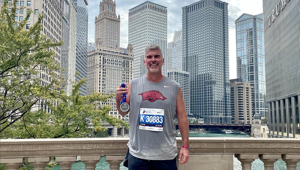
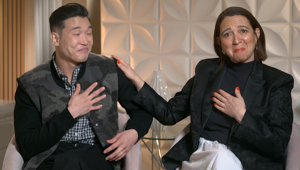
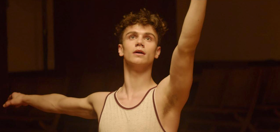
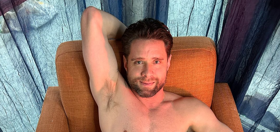
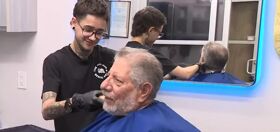

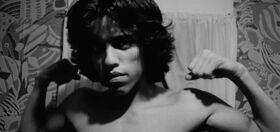
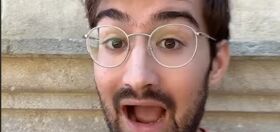

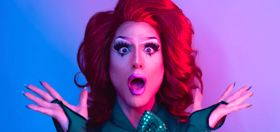
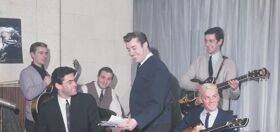



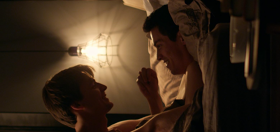
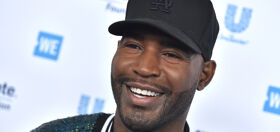
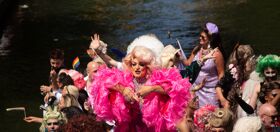

iamru2
There are Divas and then there are a holes! Nureyev sounds like an a hole. Unlike Fiennes I don’t find that fascinating, nor the fact that he’s sanitizing his sexuality because some people at the time didn’t know he was gay, that’s just absurd!
Donston
It’s a balance, because you don’t want everything to be about someone’s sexuality. You don’t want to overly highlight sex and reduce people to orientation just to please a particular demo. But I’m not really buying what Fiennes is giving. It appears many people who knew Rudolf were very aware of his same-sex preferences. And while I don’t believe in reducing people to sexual behaviors or orientation, someone’s passions, romantic interests, relationship contentment and whatever struggles they may have with those things are a decent part of who someone is. Claiming that it’s not is indeed absurd. A lot of these filmmakers/studios just don’t want to make a “gay movie”, don’t know how to flesh out characterization with any nuance or subtlety, and they simply want to make their jobs easier.
jjose712
The problem is that in HW films there is no balance, there’s erasure.
If they make a biopic of a gay man who only had a girlfriend in his teenage years they will put more focus on that relationship than in all the others he had after that.
It happened on The imitation game, and it’s blatant on Bohemian Rapsody.
I understand not wanting to focus on the sexuality of the character (rarely that’s the most interesting thing) but what they usually do is something different, it’s avoid or blur that sexuality
Donston
That’s sorta what I was aiming for. HW is scared to allow movies to be more than one thing. It’s a “gay movie” where the majority of the focus is on the character falling in love with someone of their gender, dealing with conflicts that are tied directly to that and self-realization, confusions, etc. However, if that’s not the movie’s main focus then the character’s orientation becomes inconsequential unless they’re straight. They’re pretty much gas-lighting “queers”. This wasn’t even a guy who had a long-term girlfriend or wife and didn’t seem to have any internal conflicts about his overall preferences and romantic, sexual, relationship ambitions and affections. No one’s saying you have to make it a main focus of your movie, but to completely snuff it out is not acceptable.
jcoberkrom
Fiennes is a coward. Pure and simple. I suspect the film will not do well because of his decision to make Nureyev’s sexuality a minor part of who he was.
I’m not buying what Fiennes is selling.
Urban Geezer
I lived in NYC in the 70’s and those not in the know wondered about his sexuality but his escapes in NYC eventually rather notorious including the revealing nudes that surfaced from Richard Avedon. I don’t think you should judge the film until you have seen it. I have seen it, and it’s very clear in the film that aside from an overriding confidence and ambition to dance when he is in Paris Nureyev is like a sponge eager to see and do and learn everything about Western culture. I think it’s an excellent film covering one small portion of the dancer’s life and the dancing in the film is beautiful too. I do not believe this film gives short shrift to his sexuality. But by all means, see for yourself before you condemn it. It certainly is not in the league with Bohemian Rhapsody.
Donston
It could be very good. However, being a quality movie doesn’t stop it from fitting the pattern of biopics where people who had overall same-sex preferences, passions, romantic love and ambitions get those elements of themselves snuffed out/glossed over. Or where those elements are presented as the main and only interesting thing about the person. Focusing on a specific time or specific moments have frequently been used as an excuse with stuff like this. However, I wouldn’t completely dismiss a movie I enjoyed and appreciated and thought was of quality due to social politics.
EliottlovesLucas
Russia and Ukraine are amomg the most homophobic societies in Europe see the recent controversy with Segei Polunin. Fiennes would never have been allowed to film in Russia with a “queer” Nureyev.
DCguy
So because he had to fake a crush on a woman to deal with the bigotry of the times Fiennes is using that as the excuse to claim “Well, we really don’t know he was gay”.
Just another Hollywood bigot using the closet to tell the straight-washed story.